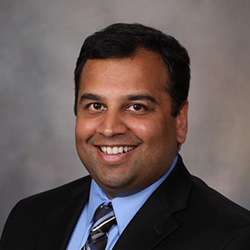While studies of human gut flora have taken place for decades, scientists have only recently started to dissect the complex relationship between the microbiome, diet, immune functioning, and overall health. As knowledge on the microbiome develops, recent research suggests that the flora in our guts could influence our risk for disease including obesity, neurological disorders, irritable bowel syndrome, autoimmune disease, and sleep disorders, to name a few.
This podcast, featuring two noted experts, will explore the impact of diet on our gut, including the role of fibers and starches, and discuss how the bugs in our gut promote proper immune functioning and overall health. To learn more about the microbiome, review IFT's own toolkit, which contains a variety of resources: https://www.ift.org/policy-and-advocacy/advocacy-toolkits
 Dr. Purna Kashyap is an Associate Professor of Medicine, Physiology and Biomedical Engineering and the Bernard and Edith Waterman Co- Director of the Microbiome program in the Center for Individualized Medicine at Mayo Clinic, Rochester, MN. Dr. Kashyap’s Gut Microbiome Laboratory is interested in understanding the complex interactions between diet, gut microbes, and gastrointestinal function. To better understand the role of gut microbes, Dr. Kashyap’s laboratory integrates data generated from multi-omic platforms with in vivo and in vitro physiological measurements from human research participants and gnotobiotic mouse models to elucidate interactions among microbiota-derived bioactive molecules and the key regulators of gastrointestinal function. By combining experimental strategies with bioinformatics analysis, Dr. Kashyap's research team hopes to develop novel microbiota-targeted therapies to treat patients with disorders resulting from altered microbiota function.
Dr. Purna Kashyap is an Associate Professor of Medicine, Physiology and Biomedical Engineering and the Bernard and Edith Waterman Co- Director of the Microbiome program in the Center for Individualized Medicine at Mayo Clinic, Rochester, MN. Dr. Kashyap’s Gut Microbiome Laboratory is interested in understanding the complex interactions between diet, gut microbes, and gastrointestinal function. To better understand the role of gut microbes, Dr. Kashyap’s laboratory integrates data generated from multi-omic platforms with in vivo and in vitro physiological measurements from human research participants and gnotobiotic mouse models to elucidate interactions among microbiota-derived bioactive molecules and the key regulators of gastrointestinal function. By combining experimental strategies with bioinformatics analysis, Dr. Kashyap's research team hopes to develop novel microbiota-targeted therapies to treat patients with disorders resulting from altered microbiota function.
 Darrell Cockburn, Ph.D. is an assistant professor of food science at Penn State University, where his interests center around the processing of dietary fiber by the human gut microbiome. Cockburn was a Postdoctoral Fellow at the University of Michigan and the Technical University of Denmark. He holds a Bachelor of Science in Microbiology and a Doctor of Philosophy in Molecular and Cellular Biology from the University of Guelph.
Darrell Cockburn, Ph.D. is an assistant professor of food science at Penn State University, where his interests center around the processing of dietary fiber by the human gut microbiome. Cockburn was a Postdoctoral Fellow at the University of Michigan and the Technical University of Denmark. He holds a Bachelor of Science in Microbiology and a Doctor of Philosophy in Molecular and Cellular Biology from the University of Guelph.
Host:
 Matt Teegarden, PhD is a food chemist and science communicator, with experience in both industry and academia. Matt is currently the Senior Researcher in the Foods for Health initiative at Ohio State, where he is largely responsible for the development and advancement of scientific operations and communications. Outside of work and IFT involvement, Matt enjoys baking and participating in LGBTQ+ recreational sports leagues around Columbus.
Matt Teegarden, PhD is a food chemist and science communicator, with experience in both industry and academia. Matt is currently the Senior Researcher in the Foods for Health initiative at Ohio State, where he is largely responsible for the development and advancement of scientific operations and communications. Outside of work and IFT involvement, Matt enjoys baking and participating in LGBTQ+ recreational sports leagues around Columbus.
IFT Podcasts

EP 4: Consumers Don’t Want to Change, So Why Are They
With up to 40,000 products in a grocery store, many consumers are on auto-pilot when deciding what products to buy.

Episode 28: Spicing Up the Future of Food
In this podcast we’ll focus on some of nature’s herbs, spices and the extracts that offer potential health benefits. We'll also talk with the article's author, Linda Ohr, about what the research tells us, as well as some entrepreneurial companies who have tapped these spices' hidden potential for their current and future product innovation.
Latest News

Cultivating a Crop of Food System Solutions
Five organizations dedicated to eliminating hunger and sustainably boosting nutrition earn top honors in this year’s Seeding The Future Global Food System Challenge.

Future-Proofing Healthy Flours
The authors describe why traditional process of stone milling holds significant advantages over modern milling methods, how the stone milling process works, and the benefits of using a stone mill processing method, including production of flours with higher nutritional and functional value.

Taking Your Order
An infographic describing consumers’ dining and ordering preferences at restaurants.

Omnivore Study Seeks Optimal Whole Food Fiber Blend Pregnant People Not Getting Enough Omega3s
Innovations, research, and insights in food science, product development, and consumer trends.

Soda With (Possible) Benefits
A look at the prebiotic soda category.

